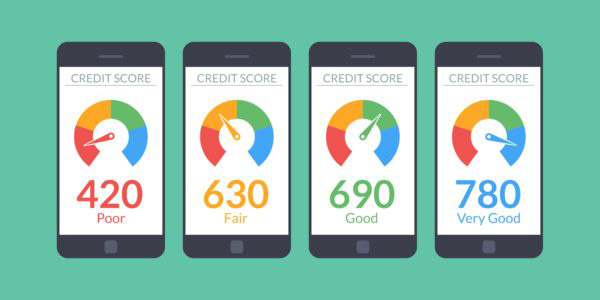We heard a radio commercial just yesterday by a company that promised it could repair your bad credit. We have also seen promises such as:
“We can remove bankruptcies, judgments, liens, and bad loans from your credit file forever“!”
“Create a new credit identity — legally.
“Credit problems? No problem!”
“We can erase your bad credit — 100% guaranteed.”
Is this really possible or are these just the false promises of scam artists?
First, let’s get one thing straight. No company can get your credit totally repaired if your credit reports are riddled with judgments, a bankruptcy, liens and items that have gone to collection. Once those types of items are on your credit reports they will stay there for seven years – all those promises to the contrary.
Know what can be done
There are some things that can be done to your credit reports to help repair your credit. But here’s the good news. You don’t have to pay a company to do this. These are things that you could do yourself and that are not all that complicated or time-consuming.
Do first things first
Maybe this goes without saying but we will say it anyway. There is nothing you can do in credit repair until you’ve seen your credit reports. The first thing you need to do is get the latest copies of your reports so you can see what it was you did that resulted in your current fix. You actually have three credit reports, as there are three credit-reporting bureaus. You can get them free on the site www.annualcreditreport.com. or from the three credit reporting bureaus –Experian, TransUnion and Equifax. In the future you may want to get each of your credit reports at four-month intervals so that you can continually monitor your credit. But for now you need all three of your reports because the credit bureaus typically don’t share information and it’s possible that there is different information in each of your reports. When you get all three, this will give you a total view of your credit situation and will enable you to repair your credit at all three of the credit-reporting bureaus instead of just one. You might also want to make a copy of your reports in the event you need to dispute some information on them. That way you could send a copy of your report to the appropriate credit bureau but would still have one for your records.
Correct any errors
As you review your credit reports look carefully for errors. These could be purchases you don’t remember having made, wrong amounts or merchants you don’t remember having done business with. If you find errors and believe they’re having an adverse affect on your credit score you need to dispute them with the appropriate credit bureau. You’ll need to tell it in writing the information you think is inaccurate. You will need to identify each thing in your report that you are disputing and the reasons why you are disputing it. And you’ll need to ask that it be corrected or removed. It’s good to enclose a copy of the credit report and circle the items that you’re disputing. Be sure to send your letter by certified mail return receipt requested.
When the credit reporting bureau receives your letter it must investigate the items you have questioned within 30 days. It must forward to the organization or business that provided the information all the relevant data that you sent it. When the business or organization receives that information from the credit bureau it must review it and then get back to the credit-reporting agency within 30 days. If it cannot verify the information or fails to respond within the 30 days, the credit-reporting bureau must remove it from your credit file. The credit bureau must give you the results of the investigation in writing and if it has corrected your credit file it must send you a new credit report free.
Tackle your past due accounts
If you have any past due accounts that are less than 180 days past due you can save them from being charged off. You will want to do this because a charged off account is one of the worst things that can happen to your credit score. To save that past-due account from being charged off you will need to contact your creditor to figure out what you will need to do to get current. In some cases, your creditor might be willing to waive some of the late penalties or even spread your past due balance over several payments. It’s important to let the lender know that you’re anxious to avoid a charge off but will need some help.
Pay charged-off accounts
If you find that you have accounts that have already been charged off you should pay them, too. You’re still responsible for them. The only good news is that as they get older they will not have as much an effect on your credit score. However, if you have a charged-off balance, it will make it difficult – and in some cases impossible – to get new credit or loans. When you pay a charged-off account in full it will show on your credit report as having a $0 balance and that the account was paid but the item will still stay in your credit files for seven years.. Alternately, you might be able to talk the creditor into settling for less than the original balance. Or you might talk the lender into deleting the status of the account as charged off if you agree to pay it.
What to do if an account has gone to collection
Many lenders will sell your unpaid account to a debt collection agency after six months. If this happens to you your approach should be about the same as for a charge-off. You’ll need to pay your balance in full or try to settle the debt for less than the original balance. Be aware that collection agencies cannot change what was on your credit report before they received your account. However, they can change any information they added to your account after they received it. Before you pay your balance in full you need to determine what information was added to your account and make sure the agency agrees to delete it.
Where to put money toward repairing your credit
Since it’s likely that you will only have a limited amount of money to put towards credit repair each month you’ll need to prioritize where you put it. You should first focus on any accounts that are close to becoming past due. Try to get as many of them current as you can. Next, go to work bringing down the balances on your credit cards. Third, work on any accounts that have already been charged off or have gone to a collection agency.
 Get new credit to help your credit score
Get new credit to help your credit score
Once you’ve done all you can to repair your credit, your next step should be to work on getting new credit. When you get new credit and make your payments on time this will help your credit score. You may not be able to get a major credit card so try applying for a retail store card. Retail merchants have the reputation for approving those applicants that have a bad or limited credit history. A second option would be to get a secured credit card. This is where you make a deposit to secure the card. Just make sure that the bank that issues the card reports how you use it to the credit reporting bureaus – to help you build a new and better credit history.







